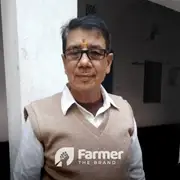
Rabindranath Chaubey is a Progressive farmer from Ballia, Uttar Pradesh. He has Acreage of 9 acres of land and has been successfully growing 12 crops in his land. He grows Paddy, Maize, Tur, Jowar, Bajra, Moong, Urad, Wheat, Peas, Gram, Mustard, and Potato. He has been applying technologies like Zero Till, Bed Planting for Wheat, Organic Farming techniques, and Shree Vidhi. Due to his advanced combination of several techniques he has been bestowed with many Awards and Honors says Rabindranath. He was in conversation with the Editor of Agriculture World, Dr. Lakshmi Unnithan. He was also a farmer in our #ftb Krishi Jagran Initiative and has been able to share his story among our readers too digitally.

He has been awarded with:
- First prize in lentil production from District Ballia by District Government of Uttar Pradesh
- Honored by the Kashi Hindu University (B, H, U,) Vice Chancellor for good production of bed planting in wheat, zero trill method
- Awarded by Seed Corporation
- Awarded by Hindustan Media
- Honored by Uttar Pradesh Atma Yojana
- Progressive Farmer Honors
Zero Trill as explained by Rabindranath is becoming an attractive alternative to the conventional tillage and sowing of wheat and rice. Direct zero drill trilling offers timely planting at reduced fuel and labour costs and therefore helps reduces the cost of production besides reduces the drudgery involved in the task.

He also does a Bed Planting system for wheat where it is cultivated in raised beds. The field is ploughed traditionally and made ready for bed planting. After wheat is taken the other following crops are also taken on the same raised beds. A specialized kind of machinery is used for planting here. After sugarcane is been harvested the wheat sowing can be done on the beds. It is particularly advantageous where groundwater is a problem and the furrows are watered instead of the crops directly. Significant water and seed saving can be done because of this bed planting system.

One could save 25 percent of seeds through this bed planting method and one needs 30-32 kg of seeds per acre. The special machine makes 70 cm wide beds. The machine drills seeds to 4-5 cm depth. The bed should be in a north-south direction. The machine costs around Rs 70,000/-25-40 percent of water-saving can also be done by this method. If there is no required amount of water in the field, after sowing within a gap of 5 days we have to give irrigation too. Through this process Rabindranath Ji says, that through this they save 25 percent of Nitrogen, ie 120 Kg Nitrogen,60 Kg Phosphorus, and Potassium 40Kgper hectare.

He explains about his Organic Farming Techniques as a technology that is based on zero budget natural farming. Farming is entirely based on cow dung and cow urine. Rabindranath Ji says “A farmer can cultivate zero budget on thirty acres of land from cow dung and cow urine”. The cow species are the indigenous species. The cow dung cow urine is used to make Ghanjivamrit and other associated products. By using them in the field, along with the increase of soil nutrients, biological activities tend to increase says Chaubey Ji. Jeevamrit can be sprayed once or twice a month in the field. While Beejamrith is used to treat seeds. The farmer following the above practices does not have to buy any kind of manure and pesticide chemicals from the market. Water and electricity for irrigation of crops also cost 10% as compared to existing cultivation. Weekly spraying of cow dung and cow urine solution from the cow is done as fertilizer and there is no loss of fertility of the land. On the one hand, where there is a quality yield, on the other hand, the cost of production is zero.

- Instead of chemical fertilizer, farmers use self-made fertilizer in agriculture. This manure is called Ghanjivamrith.
- Cow dung, chickpea gram flour, soil, good, and water are used in this preparation.
- In place of chemical pesticides, a solution made of neem, cow, and cow urine (Neemastra) is used.
- In place of market hybrid seeds, indigenous seeds are used for crop production.
- In this farming method, the farmer cost is very low, because the items used as organic fertilizer like cow dung, tree plants and vegetation, fecal urine and earthworms are available in the village in large quantities free of cost.
It's very encouraging and Inspiring to see farmers like Rabindranath Ji following practices like these which will help sustain the planet and produce enough food for India!


















Share your comments